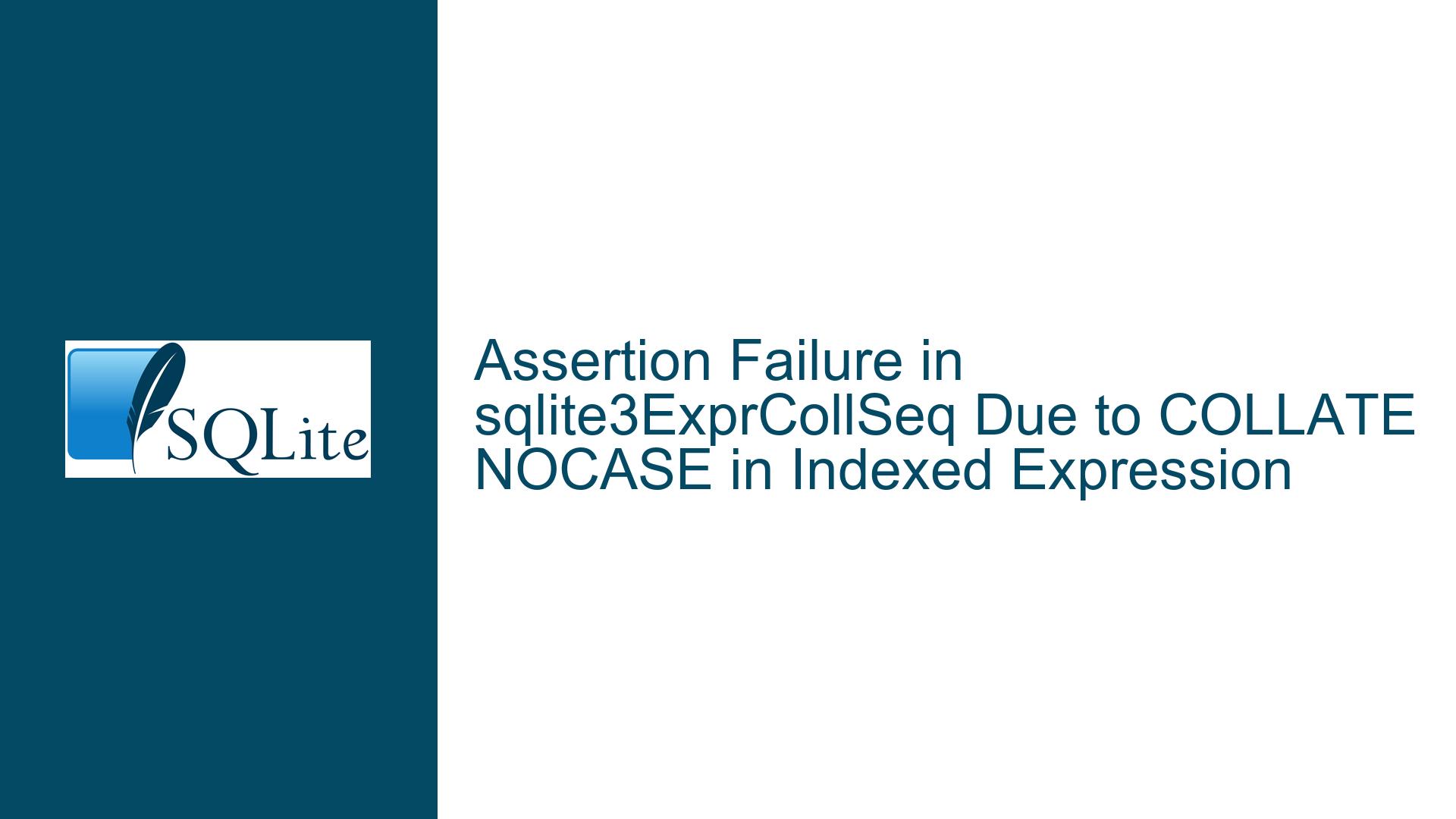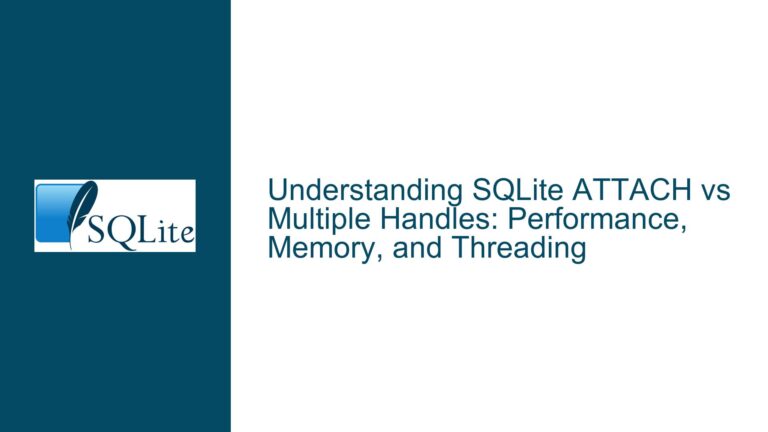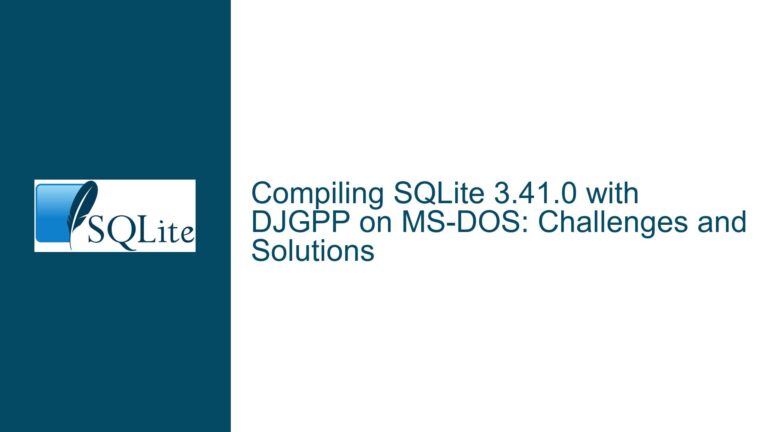Assertion Failure in sqlite3ExprCollSeq Due to COLLATE NOCASE in Indexed Expression
Issue Overview: Assertion Failure in sqlite3ExprCollSeq with COLLATE NOCASE in Indexed Expression
The core issue revolves around an assertion failure in the SQLite function sqlite3ExprCollSeq when executing a specific sequence of SQL queries. The failure occurs during the execution of a query that involves a COLLATE NOCASE clause within an indexed expression. The assertion ExprUseXList(p) fails, indicating that the expression being processed does not meet the expected conditions for the sqlite3ExprCollSeq function to operate correctly.
The problematic query sequence involves creating a table v0 with a single column c0, followed by the creation of an index i on v0 that includes an expression involving c0 with a COLLATE NOCASE clause. A view v3 is then created, which includes a subquery that references the indexed expression. Finally, a SELECT statement is executed against the view v3, triggering the assertion failure.
The assertion failure is indicative of a deeper issue within SQLite’s handling of collation sequences in indexed expressions. The failure is reproducible with the latest version of SQLite (as of the time of the discussion) and has been bisected to a specific commit range, suggesting that the issue was introduced or exacerbated by changes made during that period.
The issue is particularly sensitive to certain optimizations within SQLite. Specifically, disabling the SQLITE_IndexedExpr optimization prevents the assertion failure, indicating that this optimization plays a critical role in the manifestation of the bug. The compilation flags used during the build process also include several debugging and optimization-related flags, which may influence the behavior of the SQLite engine and the reproducibility of the issue.
Possible Causes: Collation Sequence Handling in Indexed Expressions and Optimization Interactions
The assertion failure in sqlite3ExprCollSeq is likely caused by a combination of factors related to how SQLite handles collation sequences in indexed expressions and how these expressions interact with certain optimizations. The COLLATE NOCASE clause introduces a collation sequence that affects how string comparisons are performed, and this collation sequence must be correctly propagated through the expression tree during query execution.
One possible cause is that the COLLATE NOCASE clause is not being properly handled when it is part of an indexed expression. The sqlite3ExprCollSeq function is responsible for determining the collation sequence of an expression, and it expects the expression to be in a specific state (as indicated by the ExprUseXList(p) assertion). If the expression does not meet this expectation, the assertion fails, leading to a crash.
Another potential cause is the interaction between the COLLATE NOCASE clause and the SQLITE_IndexedExpr optimization. This optimization is designed to improve the performance of queries that involve indexed expressions by reducing the number of times these expressions need to be evaluated. However, if the optimization does not correctly account for the presence of collation sequences, it may lead to incorrect behavior or assertion failures.
The bisection results point to a specific commit range where the issue was introduced or became more pronounced. This suggests that changes made during this period may have altered the way collation sequences are handled in indexed expressions or how the SQLITE_IndexedExpr optimization interacts with these expressions. The fact that disabling the SQLITE_IndexedExpr optimization resolves the issue further supports the hypothesis that this optimization is a key factor in the problem.
The compilation flags used during the build process may also play a role in the issue. Flags such as -DSQLITE_DEBUG, -DSQLITE_ENABLE_TREETRACE, and -DSQLITE_ENABLE_WHERETRACE enable additional debugging and tracing capabilities within SQLite, which can affect the behavior of the engine and the reproducibility of the issue. The presence of these flags may make the issue more apparent or easier to diagnose, but they are not the root cause of the problem.
Troubleshooting Steps, Solutions & Fixes: Diagnosing and Resolving the Assertion Failure in sqlite3ExprCollSeq
To diagnose and resolve the assertion failure in sqlite3ExprCollSeq, a systematic approach is required. The following steps outline a detailed process for identifying the root cause of the issue and implementing a solution.
Step 1: Reproduce the Issue in a Controlled Environment
The first step is to reproduce the issue in a controlled environment where the behavior of SQLite can be closely monitored. This involves setting up a test environment with the same version of SQLite and the same compilation flags as those used in the original discussion. The problematic query sequence should be executed in this environment to confirm that the assertion failure occurs.
Step 2: Analyze the Assertion Failure
Once the issue has been reproduced, the next step is to analyze the assertion failure in detail. The assertion ExprUseXList(p) in the sqlite3ExprCollSeq function indicates that the expression being processed does not meet the expected conditions. This suggests that the expression tree is not in the correct state when the function is called.
To understand why this is happening, it is necessary to examine the code path that leads to the assertion failure. This involves tracing the execution of the query and identifying the point at which the expression tree becomes inconsistent. The debugging and tracing capabilities enabled by the compilation flags (-DSQLITE_DEBUG, -DSQLITE_ENABLE_TREETRACE, etc.) can be invaluable in this process.
Step 3: Investigate the Role of the COLLATE NOCASE Clause
The COLLATE NOCASE clause is a key factor in the issue, and its role must be thoroughly investigated. This involves examining how the collation sequence is propagated through the expression tree and how it interacts with the indexed expression. The sqlite3ExprCollSeq function is responsible for determining the collation sequence of an expression, and it is likely that this function is being called with an expression that does not have the expected structure.
One possible scenario is that the COLLATE NOCASE clause is not being properly attached to the indexed expression, leading to an inconsistency in the expression tree. This could be due to a bug in the code that handles collation sequences in indexed expressions or a misalignment between the collation sequence and the expression structure.
Step 4: Examine the Impact of the SQLITE_IndexedExpr Optimization
The SQLITE_IndexedExpr optimization is another critical factor in the issue. Disabling this optimization prevents the assertion failure, indicating that it plays a significant role in the problem. To understand why this is the case, it is necessary to examine how the optimization interacts with the COLLATE NOCASE clause and the indexed expression.
The SQLITE_IndexedExpr optimization is designed to reduce the number of times indexed expressions need to be evaluated by caching their results. However, if the optimization does not correctly account for the presence of collation sequences, it may lead to incorrect behavior or assertion failures. This could occur if the optimization assumes that all expressions in the index have the same collation sequence or if it fails to propagate the collation sequence correctly through the expression tree.
Step 5: Review the Changes Introduced in the Bisected Commit Range
The bisection results point to a specific commit range where the issue was introduced or became more pronounced. Reviewing the changes made during this period can provide valuable insights into the root cause of the problem. This involves examining the commit history and identifying any changes that may have affected the handling of collation sequences in indexed expressions or the behavior of the SQLITE_IndexedExpr optimization.
If a specific commit is identified as the source of the issue, it may be possible to revert or modify that commit to resolve the problem. Alternatively, the changes may reveal a more fundamental issue that requires a more comprehensive solution.
Step 6: Implement a Fix for the Issue
Based on the findings from the previous steps, a fix for the issue can be implemented. This may involve modifying the code that handles collation sequences in indexed expressions, adjusting the behavior of the SQLITE_IndexedExpr optimization, or both. The goal is to ensure that the expression tree is in the correct state when the sqlite3ExprCollSeq function is called and that the collation sequence is properly propagated through the expression tree.
If the issue is related to a specific optimization, it may be necessary to add additional checks or constraints to ensure that the optimization does not interfere with the correct handling of collation sequences. This could involve adding new assertions, modifying the optimization logic, or introducing new flags to control the behavior of the optimization.
Step 7: Test the Fix in a Controlled Environment
Once a fix has been implemented, it is essential to test it in a controlled environment to ensure that it resolves the issue without introducing new problems. This involves re-running the problematic query sequence and verifying that the assertion failure no longer occurs. Additional tests should be conducted to ensure that the fix does not have any unintended side effects on other parts of the SQLite engine.
Step 8: Validate the Fix with Real-World Use Cases
After the fix has been tested in a controlled environment, it should be validated with real-world use cases to ensure that it is effective in a broader context. This involves running the fix against a variety of queries and database schemas to confirm that it does not introduce new issues or regressions. If possible, the fix should also be tested with different versions of SQLite to ensure compatibility.
Step 9: Document the Issue and the Fix
Finally, the issue and the fix should be thoroughly documented to ensure that other developers and users are aware of the problem and how to resolve it. This documentation should include a detailed description of the issue, the steps taken to diagnose and fix it, and any relevant code changes. The documentation should also include information on how to reproduce the issue, how to apply the fix, and any potential side effects or limitations of the fix.
Conclusion
The assertion failure in sqlite3ExprCollSeq is a complex issue that arises from the interaction between collation sequences, indexed expressions, and certain optimizations within SQLite. By following a systematic approach to diagnose and resolve the issue, it is possible to identify the root cause and implement a fix that restores the correct behavior of the SQLite engine. The key to resolving the issue lies in understanding how collation sequences are handled in indexed expressions and how these expressions interact with the SQLITE_IndexedExpr optimization. With careful analysis and testing, a robust solution can be developed that addresses the issue without introducing new problems.






